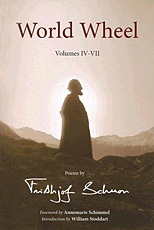Frithjof Schuon (1907-1998) was a sage, an artist, and a pioneer of interspirituality. He was called the leading light of the Traditionalist/Perennialist School of thought. During the last three years of his life, he wrote 3,500 poems in German, his mother tongue. In these volumes of them, there are autobiographical glimpses of his life, his loves, and his travels. Many allude to the world's religions; others celebrate the creative spirit in music, dance, and poetry. The poems contain references to philosophy, the questing spirit, and the ancient virtues.
In her foreword, the late Annemarie Schimmel writes:
"It seems that mystical experience almost inevitably leads to poetry. The great mystics all over the world used the language of poetry when trying to beckon to a mystery that lies beyond normal human experience, and the most glorious works in Eastern and Western religions are the hymns of the mystics, be they Sufis or Christians, Hindus or Zen monks. Different as their expressions are, one feels that the poetical word can more easily lead to the mystery that is hidden behind the veils of intellectual knowledge and which cannot be fettered in logical speech."
Frithjof Schuon believes that looking for and enjoying beauty is a primary way to nourish the soul. In many of these poems, he celebrates her varied forms:
"God created the beautiful in the world
To be an image of His intention
In the beautiful God reveals Himself —
So man must be true to his deepest heart.
Beauty is there to show God's essential intention —
And this man should understand."
And here is another aspect of beauty:
"There is the beauty that we can see or hear —
Whether it be in nature or in art;
And there is beauty in the realm of thought:
In the land of poetry, in the trails of the gods.
Every spiritual consciousness
Has an element of beauty, which we can feel;
May the blessing that radiates from the Spirit
Play on the harp-strings of our soul."
There is another kind of beauty that emanates from an openness to other paths, and Schuon models this in the following poem:
"One loves the Red Indians because they were heroes;
And the Hindus because so many have been saints;
The Japanese, because they created such wonderful art;
And the Chinese, who painted gray mountain slopes —
They painted everything that was delicate, even the wind."
